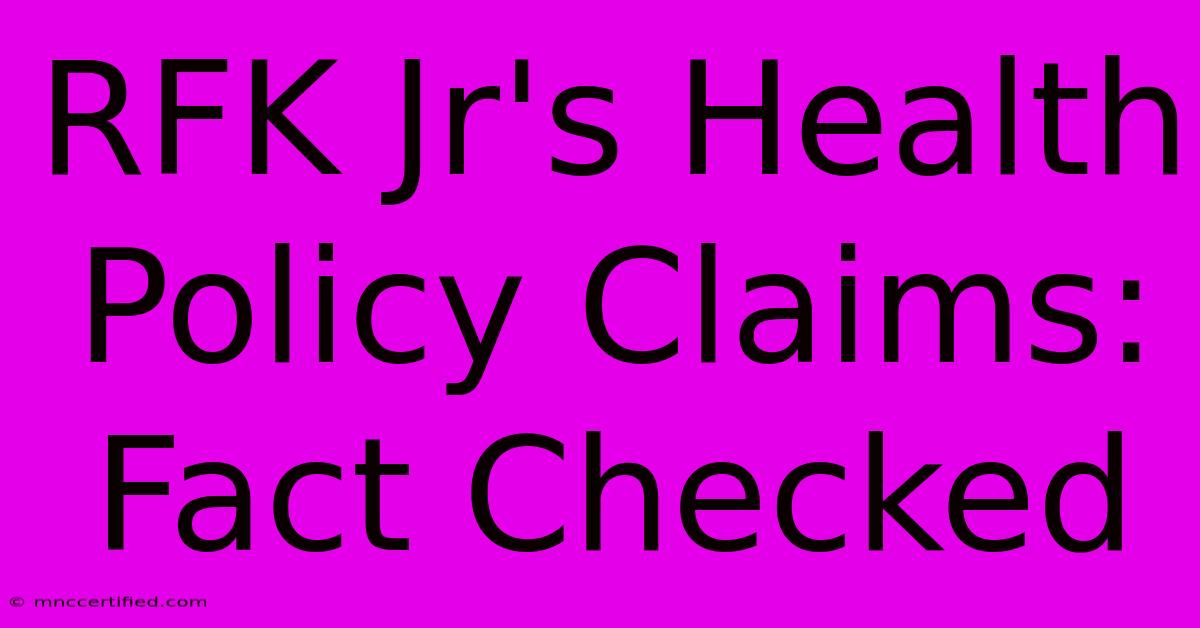RFK Jr's Health Policy Claims: Fact Checked

Table of Contents
RFK Jr.'s Health Policy Claims: A Fact Check
Robert F. Kennedy Jr.'s recent foray into the political arena has been marked by a series of pronouncements on health policy, many of which have sparked intense debate and scrutiny. This article aims to provide a fact-checked analysis of some of his most prominent claims, separating verifiable information from unsubstantiated assertions. It's crucial to approach such discussions with a critical eye, relying on reputable sources and scientific evidence.
Claim 1: Vaccine Safety and Autism
One of Kennedy's most widely discussed claims centers on a supposed link between vaccines and autism. This assertion has been repeatedly and comprehensively debunked by numerous scientific studies and leading health organizations, including the Centers for Disease Control and Prevention (CDC) and the World Health Organization (WHO). The overwhelming scientific consensus confirms no causal relationship between vaccines and autism. While some studies have explored potential correlations, none have provided conclusive evidence to support a causal link. Kennedy's continued propagation of this debunked theory is misleading and potentially harmful, as it fuels vaccine hesitancy and contributes to preventable disease outbreaks.
Key Sources:
- CDC: [Insert link to relevant CDC page on vaccine safety and autism]
- WHO: [Insert link to relevant WHO page on vaccine safety and autism]
- Numerous peer-reviewed studies: (A comprehensive list would be beneficial here, linking to studies that refute the claim. This would require significant research.)
Claim 2: The Dangers of 5G Technology
Kennedy has also expressed concerns about the potential health risks associated with 5G technology, citing potential links to various health problems. While some studies have explored possible effects of radiofrequency radiation, the scientific community largely agrees that current evidence does not support the claim that 5G poses a significant health threat at current exposure levels. The levels of radiation emitted by 5G technology are generally considered safe based on existing international guidelines. Further research is ongoing, but it's crucial to distinguish between speculative concerns and scientifically validated risks.
Key Sources:
- National Institute of Environmental Health Sciences (NIEHS): [Insert link to relevant NIEHS page on radiofrequency radiation]
- Federal Communications Commission (FCC): [Insert link to relevant FCC page on 5G safety]
- International Commission on Non-Ionizing Radiation Protection (ICNIRP): [Insert link to relevant ICNIRP page on guidelines]
Claim 3: The Role of Environmental Factors in Disease
Kennedy often emphasizes the role of environmental factors in various diseases. While this is a valid area of scientific inquiry, it's essential to distinguish between correlation and causation. Many environmental factors can contribute to health issues, such as air pollution and exposure to toxins. However, attributing specific diseases solely to environmental factors without sufficient evidence is inaccurate. Scientific research requires rigorous methodology to establish causal relationships, which is often lacking in some of Kennedy's pronouncements.
Key Sources:
- Environmental Protection Agency (EPA): [Insert link to relevant EPA page on environmental health risks]
- National Institutes of Health (NIH): [Insert link to relevant NIH page on environmental health research]
Conclusion: The Importance of Critical Evaluation
It's vital to critically evaluate health-related claims, especially those made by public figures. Relying on verifiable scientific evidence and reputable sources is paramount. While engaging in open discussions about health policy is crucial, it's equally important to avoid the spread of misinformation, which can have serious consequences for public health. This fact check aims to provide a balanced perspective on some of Kennedy's claims, encouraging readers to consult credible sources and form their own informed opinions. Remember to always consult with healthcare professionals for personalized advice. The information presented here is for educational purposes only and does not constitute medical advice.

Thank you for visiting our website wich cover about RFK Jr's Health Policy Claims: Fact Checked. We hope the information provided has been useful to you. Feel free to contact us if you have any questions or need further assistance. See you next time and dont miss to bookmark.
Featured Posts
-
Lenny Rushs Family Life Off Screen
Nov 16, 2024
-
Anchor Insurance Muskegon Michigan
Nov 16, 2024
-
United Underwriters Insurance Utah
Nov 16, 2024
-
Campbells Wake Forest Volleyball Transition
Nov 16, 2024
-
Addressing Foreign Bribery In Portugal
Nov 16, 2024